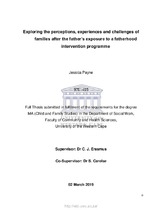Exploring the perceptions, experiences and challenges of families after the father’s exposure to a fatherhood intervention programme
Abstract
Fathers have a valuable, nurturing role to play in the lives of their children. Although a father’s availability and time with his child is important, the quality of a father’s involvement with his child is however, the strong predictor of child well-being. Therefore, Fatherhood intervention programmes desire to address fundamental issues that prevent men from succeeding in their fathering role. An understanding and evidence of the influence of fatherhood interventions on the role of the father in the family, is thus required. The aim of the study was to explore the perceptions, experiences and challenges of families after the father’s exposure to a fatherhood intervention programme. A qualitative approach with semi-structured interviews was utilized. Thematic analysis had been used to analyse the data and five themes emerged from the study. They were constructions of fatherhood, experiences and perceptions of the fatherhood intervention programme, father’s experiences of the father-child relationship after exposure to the programme, spouse/partner perceptions and experiences of their relationships with their spouse after exposure to the programme, and the facilitator’s experiences of engaging fathers. The overall outcomes were that families perceived and experienced the fathers to be more involved, responsible and sharing in parenthood after exposure to the fatherhood intervention programme. This led to an increase of father involvement with children - childcare activities, schoolwork and well-being of the children; their spouse/partner - an improvement in the quality of the relationship between the fathers and their spouses/partners and an increase involvement in the home.

